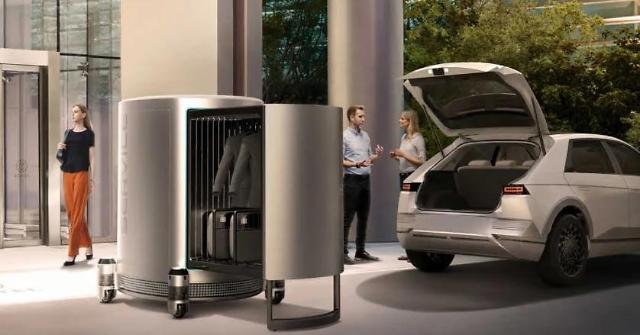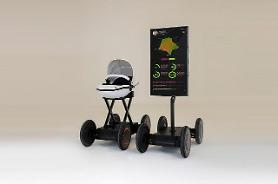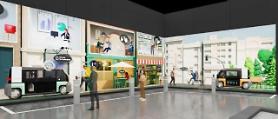
[Courtesy of Hyundai Motor]
The single-wheel unit uses a steering actuator for infinite wheel rotation. It can turn 360 degrees, enabling holonomic movement like a figure skater. LiDAR, which measures distance by illuminating the target with laser light, and camera sensors allow a PnD-enabled object to move autonomously.
"The PnD module is adaptive and expandable to match human need," Hyundai's Robotics Lab head Hyun Dong-jin said in a statement. "PnD makes normally inanimate objects mobile. It's this ability that makes changing practically any space possible. It's a way to configure spaces on demand."
PnD's driving flexibility can individualize public transportation to meet very specific, individual needs, such as a personal mobility module that attaches to a mother shuttle for most of its journey but can detach for the last mile to take the occupant directly to their final destination, the auto group said.
PnD is part of Hyundai Motor's plans for creating an advanced mobility experience with an unlimited Mobility of Things (MoT) ecosystem. "The goal is for robotics to enable all kinds of personal mobility, connected to communicate, move and perform tasks autonomously," Hyun said.
Hyundai exhibited four application concept models using a PnD modular platform that fits into an unlimited MoT ecosystem.
The personal mobility concept is a platform-based application equipped with four 5.5-inch PnD modules. The purpose-built vehicle (PBV) provides last-mile mobility for a single passenger. It is configured to use space efficiently by applying a rotary opening and closing method, and free operation is possible with a smart joystick installed on the right side of the seat without needing a steering wheel or pedal.
The L7 concept provides extreme mobility with a 12-inch enlarged PnD module. The seat rotates so that the passenger can get on and off easily, and it can be freely operated with a joystick.
Service mobility and logistic mobility concepts use the same platform,, with storage space that opens and closes like a drawer. Service mobility can be used for diverse applications, such as transporting customers' luggage in hotels, and logistics mobility can be used for transporting goods from warehouses.
The mobile eccentric droid (MobED) small mobility platform with a drive and lift (DnL) module is based on an eccentric wheel mechanism that combines the drive, steering and braking systems into one structure. With DnL mounted on each wheel, MobED can lift the platform up and down, so the body can stay level as the MobED traverses uneven terrain or low barriers such as steps or speed bumps.
MobED can be utilized for various applications and extended to both manned and unmanned system variants. The platform can also be used for service robots that can operate both indoors and outdoors. DnL modules for diverse applications, such as guide and delivery, can extend the operating range of the robot to outdoor locations.
Copyright ⓒ Aju Press All rights reserved.

![[CES 2022] Hankook Tire unveils i-Flex airless concept tire optimized for autonomous driving](https://image.ajunews.com/content/image/2022/01/05/20220105173701325776_278_163.jpg)

